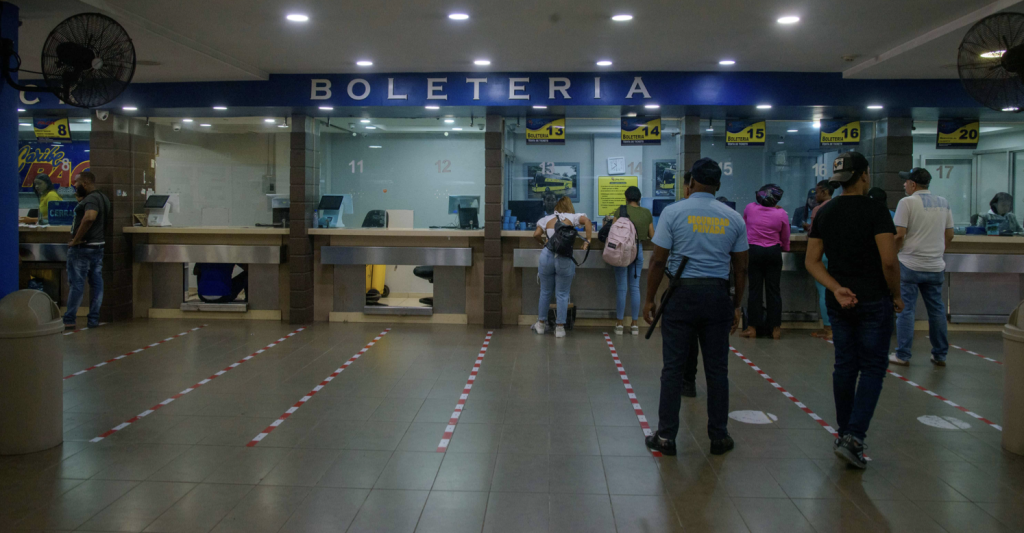
Dominican authorities are working on the restoration of bus service between Haiti and the Dominican Republic. The service was suspended after recent kidnappings in Haiti.
Diario Libre reports on the meeting Dominican ambassador in Haiti, Faruk Miguel Castillo held with the director of the Haitian Police, Frantz Elbé. Also present was the director of Intelligence of the Armed Forces of the Dominican Republic (J-2), Major General Jorge Ivan Camino Perez. The plan is for Haitian police to reinforce security on the bus routes from Elías Piña and Jimaní, in the Dominican Republic to Port-au-Prince, in order to restore the service.
The recent hijacking of busses and passengers on the Haiti to Dominican Republic route is impacting the lives of people in Haiti, the Haitian diaspora, health services and trade.
Hoy newspaper reports that the suspension of passenger transportation to Haiti by Caribe Tours, Metro and Capital Coach Line, the three lines serving routes from the Dominican Republic to Haiti, not only impacts the free movement of Haitians to their country, but also the distribution of health supplies purchased by Haitian laboratories and clinics in the Dominican Republic, the hiring of specialized Dominican personnel who provide services in the areas of communication and construction, and trade between the two countries.
Haitian businessman Ives Marie Chanel told journalist Leonor Ramírez of Hoy that the terror imposed in Port-au-Prince by criminal groups is preventing Haitians from carrying out their daily activities normally and safely.
In view of the hijacking of two buses of Metro and Capital Coach Line, these companies and Caribe Tours suspended the route to the neighboring country until the Haitian authorities guarantee their safety.
Chanel, who owns the restaurant Meson Kreyol, located on Calle Mercedes in the Colonial City, explained that Haitians traveling to the Dominican Republic are divided into three groups:
Those with less resources who cross the border on foot and then take Dominican buses to Santo Domingo or Santiago;
Informal traders who travel from Port-au-Prince, Gonaives, Hinche and Mirebalais;
The more affluent who use Caribe Tours, Metro and Capital Coach Line.
He said the temporary bus suspension affects thousands of Haitians residing in the United States, Canada, Mexico, Chile and Argentina, who fly into the Dominican Republic and then take the bus to Haiti. He estimated at more than 30,000 the Haitians that in the past three years land at Las Americas (Santo Domingo) and Punta Cana airports. Only two airlines operate flights into Haiti, so there is a regular shortage of seats and the cost of these is higher than offered by flights to the Dominican Republic.
He said that the migratory flow of Haitians to the Dominican Republic is constant, especially to work in the farms and construction. Nevertheless, he said that the insecurity in Haiti has caused businesspeople, traders, university students and professionals to relocate to the Dominican Republic.
Chanel pointed out that, due to the same circumstances, Haitian-American citizens have investments in the country, especially in the tourist areas.
“People from the diaspora travel a lot to Santo Domingo, because there are many parties in the country, with Haitian musical groups performing in Higüey, Santiago and Santo Domingo, then there is a flow of the Haitian diaspora coming to Santo Domingo to see their loved ones.
“Others rent houses for their relatives because they do not want to leave them in Haiti for security reasons,” he stressed.
Chanel further expressed that, contrary to popular belief, all of Haiti is not in the hands of criminal gangs, as the epicenter of their actions is in Port-au-Prince. He said life is calmer in the South and North regions.
Read more in Spanish:
Diario Libre
Hoy
19 May 2022

